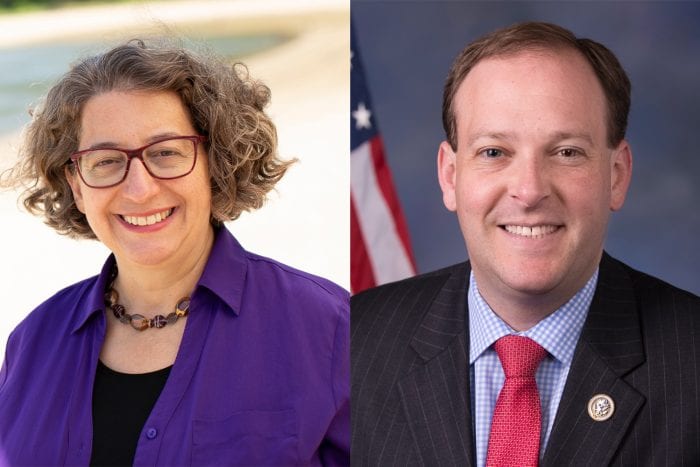Zeldin and Goroff Make Their Case for Congressional Seat

In a race as hotly contested as that for the House of Representatives’ 1st Congressional District seat, much of the actual policy and positions of candidates is often buried under disinformation and a slate of attack ads. Still underneath all that rigamarole is a decision that goes beyond a question of red or blue.
U.S. Rep. Lee Zeldin (R-NY1), who has held the seat for the past five years, is squaring off against Democrat Nancy Goroff, a scientist from Stony Brook who has worked in multiple executive positions at Stony Brook University.
TBR News Media hosted a debate Oct. 23 with both candidates via Zoom, asking them their stances beyond the attack ads on issues from the environment to health care to the COVID-19 response on the federal level.
Zeldin is looking to retake his seat based on his work in getting masks and other PPE to his home county, the money he helped steer to protecting the Long Island Sound and his help getting the Electron-Ion Collider to Brookhaven National Laboratory.
“When the coronavirus first hit us, I worked with elected officials on both sides of the aisle and all levels of government to secure ventilators, PPE, funding, access to the municipal liquidity facility and so much more,” he said. “We have more work to do.”
Goroff is running on her experience as a scientist, particularly in helping to combat climate change and continue the fight against COVID-19, as well as her administrative work at Stony Brook University working in a department with a multimillion-dollar budget.
“I want our kids to live in a world where the government is trying to make people’s lives better, and where policy decisions are based on facts and reality,” she said. “I’m going to bring all these experiences to Washington, to be there for the people of this district no matter what.”
COVID-19 Response
The candidates differ greatly in how they see the pandemic was handled at the federal level. While Goroff lambasted the federal government for a “lack of leadership,” Zeldin emphasized the work getting pandemic resources to folks at home.
Goroff said while New York may have been able to dig in its heels early in the face of the virus, the federal government dropped the ball. She cited reports that President Donald Trump (R), and by extension other federal officials, knew early on in January how bad the virus was but misled the public on how dangerous and severe the virus would be in the early 2020 months.
She said the government did not work early enough to get PPE into the hands of those who need it, and that the president still resists promoting the wearing of masks, contact tracing and testing.
“We should have had national action to make sure every community had the PPE they needed, not just whoever makes a phone call to [the president’s son-in-law] Jared Kushner on a Saturday night,” she said. “Here in New York we have no borders, no walls between us and other states, and as long as the numbers are going up elsewhere, we are in danger here.”
Zeldin said the key to dealing with the ongoing pandemic is the same now as it was before, with bipartisan effort. He cited the USNS Comfort coming to New York as well as the Javits Center being converted into a temporary hospital, as well as his connection with the executive officials to secure needed ventilators, testing and finances for New York.
“We were approaching it not as Republicans first or Democrats first, but as Long Islanders, New Yorkers and Americans first,” he said.
Currently, Republican Senate majority leader, Mitch McConnell, has said the Senate will be in recess until Nov. 9 after the election, which means there will likely be no deal on a stimulus bill for now. In terms of economic stimulus for New York, the congressman said it’s “extremely likely” there will be a bill within the next few weeks, which would include money for families, additional Paycheck Protection Program funding, money for state and local governments, food assistance and testing.
“From all conversations I’m hearing, all these pots of money are quite robust, hovering around the $2 trillion number,” he said. “I don’t think we can have this money fast enough, of course it will take both Republicans and Democrats to agree.”
Goroff said it is imperative we receive assistance from the federal government, both in state and local aid. The problem is though the Democrats in the House have put forward a relief bill that has been rejected by the Republican-controlled Senate, and McConnell has instead focused on rushing the process of the now-installed Supreme Court Justice Amy Coney Barrett.
“We are in an economic crisis that will require significant investment in infrastructure, and particularly clean energy infrastructure so that as we rebuild our economy, we can build the future we want for ourselves and our kids,” Goroff said.
She criticized Zeldin for voting against that original House assistance bill. In response, the congressman said that bill was “known to be dead on arrival once it passed the House,” as a “one house messaging bill.” He said there were several so-called “poison pills” included in that bill that would never get broad support.
Environment and Climate Change
While Zeldin touted his bipartisan support of local environmental initiatives such as the Long Island Sound Stewardship Act, Goroff said more work is needed, especially regarding the response to climate change.
Zeldin cochairs the Long Island Sound Caucus, and said as the one Republican voice in the caucus they need to increase the investment into the Long Island Sound Program. He said there is room in the stewardship act to increase the appropriation as well as the National Estuary Program and Sea Grant.
The congressman added he has worked hand-in-hand with the U.S. Army Corp of Engineers so that two-thirds of their budget was for projects in the 1st Congressional District.
Goroff said the work done so far to impact the Long Island Sound has been “helpful,” but more needs to be done with not only cleaning the water, especially with creating sewering and providing funds for projects to help reduce the amount of nitrogen going into the water from aging cesspools and septic systems. She also spoke on the need for more coastal resilience.
“We should be restoring wetlands to make sure we have as much resilience as possible, but we must be investing in our coastlines because they are so important to tourism, our economy and our way of life here,” she said.
However, Goroff said there’s an even bigger challenge with climate change. She said her office could be a “resource for every member of Congress, Democrat or Republican” about information related to climate change.
She said the U.S. should aim to be carbon neutral in energy production by 2035. The scientist added the county should invest more heavily in clean technologies from transportation to infrastructure, as well as invest in research currently going on at BNL and SBU. Such innovations could be exported to other heavy polluter countries so they can better reduce their carbon footprint.
Zeldin said he serves on the House Climate Solutions Caucus, and has cosponsored the Carbon Capture Improvement Act to provide financial incentives to invest in carbon capture equipment.
“The way to achieve results on this is to talk to each other, not past each other and work together on these legislative initiatives,” he said.
He added he has cosponsored legislation to renew solar investment tax credit, and that he supports new research and offshore wind farm developments off Long Island’s coasts.
Health Care
With multiple efforts to repeal the Affordable Care Act in Congress over the past four years, the CD1 candidates both had strong words for each other regarding what the future of America’s health care system should be.
Goroff said she believes every American should have access to high-quality, affordable health care. She said the ACA should be strengthened, and the ongoing pandemic has shown how unequal access to health care has been. She said she would expand the minimum age for Medicare, and said she would support allowing young people or employers to buy into Medicare as well.
“I strongly support expanding Medicare and making Medicare a public option,” she said.
Zeldin said despite the way such topics become more politicized closer to election, the best way for the country to move forward on health care is by working in a bipartisan way. He cited efforts in Congress to impact prescription drug costs. A bill to that effect went forward out of committee, but that bill “became a partisan messaging bill, much to the chagrin of the Republicans and Democrats who put the bill together.”
He said he has supported efforts to protect people with preexisting conditions getting access to health care, and that he has cosponsored bills to have policies across state lines.
Goroff said Republicans have been working to end the ACA, one by opening up the law to judicial action by removing the individual mandate. She also went after Zeldin for his past history voting to repeal the ACA 15 times in the past several years without offering a new plan to replace it.
“They have taken the actions that specifically put [the ACA] at risk and there are 71,000 people in this district who would have lost their health care if Mr. Zeldin and his party were successful,” she said. “To say now after four years of the president would come up with something … when they still have not offered what their vision would look like, is hypocrisy.”
Zeldin said he voted against the Tax Cuts and Jobs Act bill that removed the individual mandate, though he added a one-size-fits-all approach is not the answer with health care.
“Of 535 members of Congress, I don’t know a single person in Congress who’s actually against covering individuals with preexisting conditions,” he said.
SALT Cap and LI’s Brain Drain
As the pandemic leads into a new looming economic crisis, many fear more people could be leaving Long Island. As the 2017 Tax Cuts and Jobs Act capped the state and local tax deductions at $10,000 per year, both candidates said they would work to end that cap, as well as bring jobs to Long Island to halt the exodus.
Goroff said the SALT deduction is something she would see reinstated in full instead of being capped.
“You don’t need to have a very large house here to have a $10,000 tax bill,” she said.
She said while working as associate provost at SBU she developed entrepreneurial programs for students and heard from local business leaders whether their kids could stay here.
“The way we deal with it is to make sure we have good jobs for people,” she said, adding that SBU is a resource which should be tapped to help with new business concepts. She added new green technologies like upcoming offshore wind projects will help keep more people on Long Island.
She also criticized her opponent for voting “no” on a bill that would have brought back the SALT deductions introduced by U.S. Rep. Tom Suozzi (D-NY3).
Zeldin said he has introduced several bills to restore the SALT deductions. Suozzi’s bill, which the local congressman said he “would have voted for,” had “required an additional tax increase to be named later” to pay for the deduction’s reinstatement.
Besides that, he argued the people who benefited the most from the deductions were already relatively wealthy, and those who could already afford to stay.
“Creating more jobs, job growth, bringing down electric costs, controlling tax increases, there’s a lot more that goes into the discussion why for a very long time why we’re losing members of our family to North Carolina, South Carolina and Florida,” he said.






